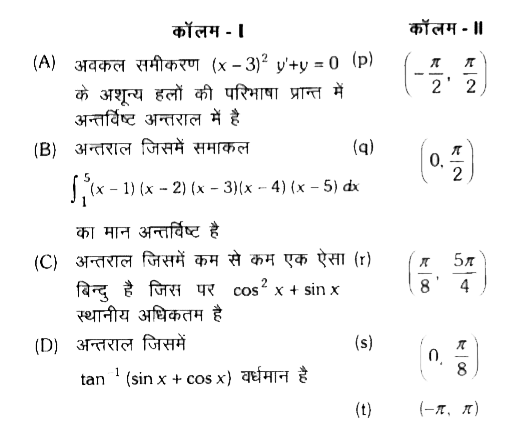तीन यूलर प्रतिस्थापन की मदद से ∫R(x,√ax2+bx+c)dx के समाकलनों के रूप को निकाला जाता है |
(i) √ax2+bx+c=t±x√a, यदि a > 0,
(ii) √ax2+bx+c=tx±√c, यदि c > 0,
(iii) √ax2+bx+c=(x−a)t, यदि ax2+bx+c=a(x−a)(x−b) अर्थात में यदि α,ax2+bx+c=0 का वास्तविक मूल है |
x के प्रतिस्थापन के द्वारा ∫xdx(√7x−10−x2)3 ज्ञात हो सकता है
x=5+2t2t2+1
x=5−t2t2+2
x=2t2−53t2−1
इनमें से कोई नहीं
The correct Answer is:A
Topper's Solved these Questions
- अनिश्चित समाकलन BOOK - ERRORLESS HINDICHAPTER - अनिश्चित समाकलन EXERCISE - JEE ADVVANCED (INTEGER TYPE QUESTIONS )
3 Videos
- अनिश्चित समाकलन BOOK - ERRORLESS HINDICHAPTER - अनिश्चित समाकलन EXERCISE - JEE ADVVANCED (MATRIX MATCH TYPE QUESTIONS )
2 Videos
- अनिश्चित समाकलन BOOK - ERRORLESS HINDICHAPTER - अनिश्चित समाकलन EXERCISE - JEE ADVVANCED (REASONING TYPE QUESTIONS )
6 Videos
- PAPER(12 APRIL : SHIFT-2)BOOK - ERRORLESS HINDICHAPTER - PAPER(12 APRIL : SHIFT-2)EXERCISE - बहुविकल्पीय प्रश्न
30 Videos
- अवकल समीकरण BOOK - ERRORLESS HINDICHAPTER - अवकल समीकरण EXERCISE - JEE Advanced ( Matrix Match type questions )
3 Videos
Similar Questions
f(x)=∫xsinx(1+xcosx.Inx+sinx)dx
यदि F(x)=xsinx=esinxInx
View Solutionकॉलम Iकॉलम II(A)यदि∫2x√1−4xdx=ksin−1(f(x))+C,(p)0तो k किससे महत्तम है(B)यदि∫(√x)5(√x)7+x6dx=a lnxkxk+1+c,(q)1हो, तो ak किससे न्यूनतम है(C)∫x4+1x(x2+1)2dx=k ln|x|+m1+x2+n,(r)3जहाँ n समाकलन का अचर है, तो mk किससे महत्तम है(D)∫dx5+4cosx=ktan−1(m tanx2)+C,(s)4 हो k/m किससे महत्तम है
View Solutionमाना F(x),sin2x का अनिश्चित समाकलन है
कथन-1 : फलन F(x),F(x+π)=F(x) को संतुष्ट करता है, सभी वास्तविक x के लिए
क्योंकि,
कथन-2 : sin2(x+π)=sin2x सभी वास्तविक x के लिए
View Solutionमाना की f(x)=5−[x−2] तथा g(x)=|x+1|,xεR यदि f(x) का अधिकतम मान α तथा g(x) का न्यूनतम मान β पर है, तो limx→−αβ(x−1)(x2−5x+6)x2−6x+8 बराबर है
View Solution
View Solutionint sqrt(x)(ax^(2)+bx+c)dx
View SolutionEuler's substitution:
Integrals of the form ∫R(x,√ax2+bx+c)dx are claculated with the aid of one of the following three Euler substitutions:
i. √ax2+bx+c=t±x√aifa>0
ii. √ax2+bx+c=tx±x√cifc>0
iii. √ax2+bx+c=(x−a)tifax2+bx+c=a(x−a)(x−b) i.e., if α is real root of ax2+bx+c=0
Which of the following functions does not appear in the primitive of 11+√x2+2x+2 if t is a function of x ?
View SolutionEuler's substitution:
Integrals of the form ∫R(x,√ax2+bx+c)dx are claculated with the aid of one of the following three Euler substitutions:
i. √ax2+bx+c=t±x√aifa>0
ii. √ax2+bx+c=tx±x√cifc>0
iii. √ax2+bx+c=(x−a)tifax2+bx+c=a(x−a)(x−b) i.e., if α is real root of ax2+bx+c=0
Which of the following functions does not apear in the primitive of dxx+√x2−x+1 if t is a function of x?
View SolutionEuler's substitution:
Integrals of the form ∫R(x,√ax2+bx+c)dx are claculated with the aid of one of the following three Euler substitutions:
i. √ax2+bx+c=t±x√aifa>0
ii. √ax2+bx+c=tx±x√cifc>0
iii. √ax2+bx+c=(x−a)tifax2+bx+c=a(x−a)(x−b) i.e., if α is real root of ax2+bx+c=0
∫xdx(√7x−10−x2)3 can be evaluated by substituting for x as
View Solution√ax2+bx+c
View Solution√ax2+bx+c का अवकलन कीजिये|
View Solutioncos(ax2+bx+c)+sin3√ax2+bx+c
View Solutionसमाकलन करें
∫2ax+b√ax2+bx+cdx
View SolutionLet a, b, c be non zero numbers such that int_(0)^(3)sqrt(x^(2)+x+1)(ax^(2)+bx+c)dx=int_(0)^(5)sqrt(1+x^(2)+x)(ax^(2)+bx+c)dx . Then the quadratic equation ax^(2)+bx+c=0 has
View Solutionঅন্তরকলজ নির্ণয় করো: √ax2+bx+c
View Solution
